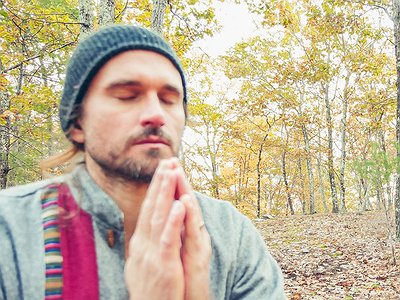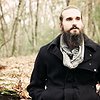Part 1
Name: Christopher Bono
Nationality: American
Occupation: Composer, producer, songwriter
Current Release: Nous Alpha's A Walk In The Woods', is out now on Our Silent Canvas.
Recommendation: Select suttas of the Pali Canon. The whole thing if you’ve got the interest. But that’s a massive undertaking. In particular the Satipatthana Sutta and the Anapanasati Sutta are such extraordinary roadmaps for the exploration of being and consciousness. That along with any teachings on the Brahmaviharas, a beautiful one being the Metta Sutta but of course there are many more. The profound depth of these suttas is a lifelong study that I’ve found immensely beneficial.
Musically, the richest source of condensed musical content I know of is in Bach’s Well-Tempered Clavier, Books I and II. I suggest to any musician they play through this 10-15 minute each day, it’s a lot like brushing your teeth, taking your vitamins or doing your breathing exercises. For non-musicians, consuming Bach (and of course many others) is a wonderful form of mental stimulation I believe develops the cognition capacity of the mind in ways we’re yet to understand.
If you enjoyed this interview with Christopher Bono and would like to find out more about his work with Nous Alpha and Ghost Against Ghost, visit his page on the website of his label Our Silent Canvas. There is also a Nous Arts Facebook page.
For insights from his Nous Alpha partner, read our Gareth Jones interview.
When did you start writing/producing music - and what or who were your early passions and influences? What was it about music and/or sound that drew you to it?
I was born into a musical family but didn’t really discover playing music till I was in college. I was a serious baseball player growing up, and while at University I was injured and required two surgeries, while recovering from those surgeries I picked up a guitar to pass the time and process my emotions. I had begun learning a little guitar about four years earlier, and found out it came quickly, so it was natural for me to return to it. I ended up having to give up baseball because of the injuries, and I transposed my athletic passion directly into music and have not looked back since.
At the time, I was quite depressed experiencing my lifelong athletic dreams dissolving, but it was the memory of my mother playing classical music most evenings growing up that inspired in me to look inward for my own capacity and interest in music making. Early on I was into classic rock, folk, singer songwriter and 90’s rock. But as I delved deeper and deeper into music I began to be pulled more into studying classically. I eventually devoted 7 years to an in-depth, primarily classical study of music, that was a massively transformative period.
But before that I was grounded in all the basic classic rock stuff, Beatles, Dylan, Led Zeppelin, Pink Floyd and then of course my tastes blossomed dramatically outward from there.
For most artists, originality is preceded by a phase of learning and, often, emulating others. What was this like for you: How would you describe your own development as an artist and the transition towards your own voice?
This was absolutely true for me. A Bach quote I had hanging in my room for years sums up my general approach to my routine of the Musical Life. “Ceaseless work, analysis, reflection, writing much, endless self-correction, that is my secret.” Of course, I don’t work nearly as hard as Bach did nor do I have an ounce of his talent, but I derive much inspiration from his genius as I try to play through some Bach on piano every day and have done so now for probably nearly 10 years with some off and on periods.
I often reflect on a period of transition in my late twenties when I was striving to shift from being an NYC Downtown singer songwriter to something else; I was seeking to learn more and more about production and composition, and it culminated in developing the Ghost Against Ghost project. I remember at the time, I felt extremely frustrated as I couldn’t finish anything, and I felt like I had nothing to say even though I wanted to express something, but I couldn’t get in touch with it. It was a form of writer’s block that lasted a few years, and I remember being extremely frustrated with it at the time.
Looking back, I can see all the striving and learning was brewing a capacity that then erupted into several releases over a ten-year period, much more than I can actually handle putting out! What I learned from that period and what I would tell my own son, or a younger artist is to learn to trust the present moment, don’t judge your output, especially at first, just do the work, make the sounds, put it aside and listen through later and see if you hear something. This constant attempt to create, then analyze or edit later, eventually led to a method of production that is quite efficient, at least relative to the experience of writer’s block.
How do you feel your sense of identity influences your creativity?
My opinion is that generally the sense of identity tends to get in the way of creativity more than anything. The stronger my sense of identity is in any moment, the more expectation I have, the more unpleasant the creative experience is the results tend to be of a lesser quality. My greatest work happens when the sense of self disappears and the mind sinks deeper into the moment, eventually experiencing that I’ve forgotten who, where or what I am. For me, that’s when the magic happens, the new Nous Alpha album is a great example of this.
What were your main creative challenges in the beginning and how have they changed over time?
The transition from baseball player to musician was an extremely challenging time. Chasing a new dream in which I had little to no experience at an older age seemed like an impossibility, and I spent the first few years practicing 14-16 hours a day feeling like I needed to “catch up”.
Being older and wiser now, I realize that isn’t necessary as there is inherent creativity available at any place on the path, but I was always driven to deepen my understanding about music in a scientific kind of manner.
The second major period of creative challenges was the period of writer’s block that came in my mid to late twenties when I was expanding my musical tastes and capacity. Again, looking back, much like a bad trip, you realize those periods of mental suffering were necessary stages in the evolution of the person and artist you’re yet to become.
As creative goals and technical abilities change, so does the need for different tools of expression, be it instruments, software tools or recording equipment. Can you describe this path for you, starting from your first studio/first instrument? What motivated some of the choices you made in terms of instruments/tools/equipment over the years?
I began on guitar, singing and writing songs around 21. I recorded my first “album” about a year in on a little Boss digital multi-track. As the years went by my octopus-like interest in multiple instruments grew alongside the technical interest in music productions.
It was only about 5 years into music making that I realized the studio was my instrument. I saved and borrowed a lot of money to purchase way too much gear in my late twenties, but in the midst of all that I learned a great deal about recording, engineering and sonic possibility. I’m now in my third studio, from a dingy practice space in Midtown Manhattan, to Brooklyn, to a house in Woodstock, finally to a big barn in Upstate NY. I spent a year general contracting the renovation and buildout of this new studio in an old barn, it’s become like a massive temple to the Music Devas. Gareth knows this well as we dedicated the space with the first Nous Alpha album.
Have there been technologies or instruments which have profoundly changed or even questioned the way you make music?
Piano, Ableton Live and Sibelius Notation Software have profoundly supported my evolution.
As far as questioning the way music is made and experienced, streaming and the current consumption of music has been hard to evolve into. Of course, the sake of ease and search and discovery that comes with Spotify etc. is extraordinary, however I have struggled with the devolution of physical product and the rise of streaming with a sense of anxiety and melancholy that is hard to explain.
I remember being in middle school and high school and one of the highlights of life was going to the record store and finding albums. The joy of discovery that one experienced there and the relationship with the music is not the same in the current era. The streaming world just feels like an infinite river of noise and releases to try and wade through, and with the infinite opportunity sometimes I feel a kind of listening paralysis. I also personally think the rise of streaming and playlists has destroyed the art of the album, and long form composition, which is unfortunate for the deeper appreciations and impact of the artform.
Collaborations can take on many forms. What role do they play in your approach and what are your preferred ways of engaging with other creatives through, for example, file sharing, jamming or just talking about ideas?
I’ve had the wonderful joy of finding great friends to develop some extremely special collaborations.
Beginning with Nous Alpha, Gareth and I first met working on a mix for my Ghost Against Ghost project and we soon learned we had a lot of interests in common philosophically and spiritually. I think it was on our minds to work together for some years before we finally said let’s do the first album at the new barn. That recording experience was probably the easiest and most enjoyable recording experience I’ve had, so I believed we were onto something special and I think the new Nous Alpha record shows that.
I also have a very special collaborative album with Norwegian vocalist and sound healer, Cecilie Hafstad. This project is called Gabbarein (Sami language for ‘White Reindeer’). We recorded it in the arctic circle in the north of Norway, and it is absolutely magical.
The improvisational ensemble NOUS is entirely devoted to collaboration and improvisation. Between the two different incarnations we’ve now had over 30 different musicians involved, and that is another worthwhile collaboration. It’s interesting because most of my work is done in complete isolation composing and often performing everything. However, looking back and forward my work is just as much defined by unique collaborations with many talented beings bringing me immense amount of personal growth.






